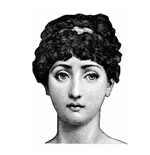
In Praise of Weakness
HUMILITY: THE KEY TO SANCTITY
Feminists are known to become enraged when women are dubbed “the weaker sex.” Given that the holy liturgy, while referring to Eve’s daughters, uses this epithet, it is a topic worthy of discussion. The word “weak,” like many in our vocabulary, has several meanings. It can refer to what is delicate, fragile, and in need of protection. Precious porcelain is more fragile than plates bought at the five and dime. A baby is “weaker” than a dog. “Weak” can also mean morally vulnerable, more likely to yield to pressure and temptation, less courageous. Hamlet’s words, “Frailty, thy name is woman,” have been quoted innumerable times, and will continue to be applied to what is also called “the fair sex.”
When speaking of female martyrs, the liturgy hails them with special honor because God’s power and greatness is best manifested by the fact that these “weak” creatures faced the most refined tortures with a fortitude that matched that of the most courageous of men. One easily forgets that one needs courage to face labor pains and give birth. Surprisingly, this is rarely mentioned today, even though, in the Old Testament, when an inspired writer refers to grave trials, he often adds “like a woman in labor.”
One can accurately take the pulse of a society by examining the virtues it extols. Today, efficiency, creativity, flamboyance, success, and inventiveness steal the show. Names like Bill Gates and Oprah Winfrey are applauded, praised, envied, and regarded with awe. They are success stories. Contrarily, heroic service, humility, patience, and forgiveness rarely make the headlines — at least not as long as the virtuous person lives.
If women feel justified in taking offense when they are dubbed the “weaker sex,” should men be offended because they are not referred to as “the fair sex”? Does it mean they are ugly? As far as I know, men have not yet protested against this alleged “discrimination.”
You May Also Enjoy
An absurd question, you may well respond. Why, the longest biographical article in the Encyclopaedia…
Reviews of Antonio Gramsci: Architect of a New Policy... Our God is Nonviolent... Nuclear Catholics and Other Essays... Liberal Arts and Community The Feeding of the Larger Body... Beyond the Mirror... The Oxford Illustrated History of Christianity
To all the people not theologically schooled, a definite message has been communicated about the meaning (or lack thereof) of the Eucharist.

